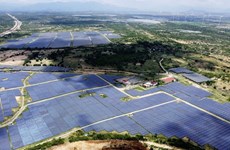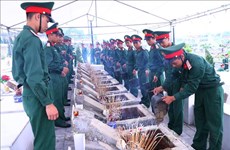Workshop to enhance community engagement in corruption prevention
A workshop was held on December 19 in
Hanoi to discuss ways to complete the legal framework for enhancing
community’s monitoring of investment in poverty reduction and hunger
eradication projects, in a bid to prevent corruption.
A workshop was held on December 19 in
Hanoi to discuss ways to complete the legal framework for enhancing
community’s monitoring of investment in poverty reduction and hunger
eradication projects, in a bid to prevent corruption.
Participants recommended relevant bodies seek ways to raise community’s awareness of the benefits from the projects and the significance of their role in monitoring the implementation process.
The recommendations were made on the basis of the result of a survey on the issue conducted by the Government Inspectorate and the Irish Embassy in Vietnam in four localities representing the northern mountainous, central and Mekong Delta regions with 864 questionnaires.
According to the survey, 80.1 percent of the interviewees said they would report to relevant bodies when they know about any corruptive activities while the rest chose to keep silent. This means many wrongdoings are not reported and dealt with properly.
In addition, 74.7 percent said community’s supervision did help detect wrongdoings in the implementation of poverty reduction and hunger eradication projects, with the most common one being ineffective and wasteful investment.
The survey also showed that 28.9 percent of complaints and petitions are completely accurate and 71.1 percent are partially right, reflecting the good performance of community supervision bodies in collecting the public opinions and reporting to authorized agencies for investigations.
The Vietnam Fatherland Front chapter at the communal level was cited as the community supervision body by 69.7 percent of the survey respondents, while 61.3 percent said it was the communal inspection body set up under the national programme for poverty reduction 135 or people-elected representatives.-VNA
Participants recommended relevant bodies seek ways to raise community’s awareness of the benefits from the projects and the significance of their role in monitoring the implementation process.
The recommendations were made on the basis of the result of a survey on the issue conducted by the Government Inspectorate and the Irish Embassy in Vietnam in four localities representing the northern mountainous, central and Mekong Delta regions with 864 questionnaires.
According to the survey, 80.1 percent of the interviewees said they would report to relevant bodies when they know about any corruptive activities while the rest chose to keep silent. This means many wrongdoings are not reported and dealt with properly.
In addition, 74.7 percent said community’s supervision did help detect wrongdoings in the implementation of poverty reduction and hunger eradication projects, with the most common one being ineffective and wasteful investment.
The survey also showed that 28.9 percent of complaints and petitions are completely accurate and 71.1 percent are partially right, reflecting the good performance of community supervision bodies in collecting the public opinions and reporting to authorized agencies for investigations.
The Vietnam Fatherland Front chapter at the communal level was cited as the community supervision body by 69.7 percent of the survey respondents, while 61.3 percent said it was the communal inspection body set up under the national programme for poverty reduction 135 or people-elected representatives.-VNA













